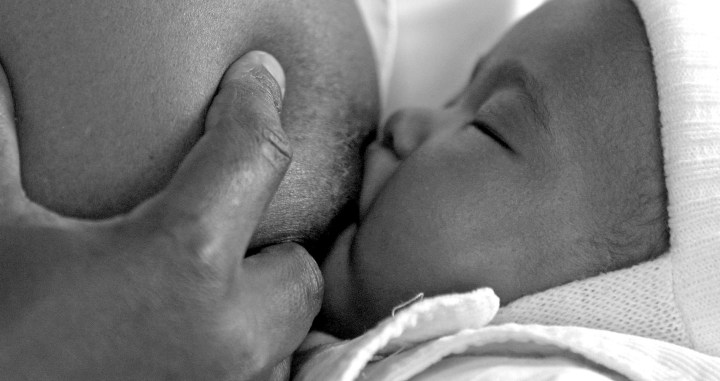MAVERICK CITIZEN OP-ED
Mothers need help and support if they are to breastfeed their babies for an optimal time

In my research, some mothers expressed the age-old cultural belief that whatever you felt at the time, was transmitted via breast milk to their infants. Mothers felt anger, pain and disappointment and were cognisant that these negative feelings, like their own hunger, could be shared with their young.
Chantell Witten is a lecturer at the University of Free State and serves as the Nutrition Lead for the South African Civil Society for Women’s, Adolescents’ and Children’s Health (SACSoWACH). More information about her research on breastfeeding can be found here.
“When I am hungry, I even breastfeed her my hunger.” These were the words of one of my research participants back in December 2018. Long before Covid-19’s arrival.
It’s the countdown to World Breastfeeding Week 2021, the annual global campaign to raise awareness about the importance of breastfeeding. The campaign has called on governments and all sectors of society to promote, protect and support breastfeeding since 1992. Much of the world has suboptimal breastfeeding rates, despite all these global and local breastfeeding promotion efforts.
This year’s global theme is: “Protect breastfeeding, a shared responsibility”.
But how can we call on women to breastfeed when women’s circumstances are far from favourable to enable them to breastfeed successfully, much less optimally? Optimal breastfeeding entails exclusive breastfeeding from birth for the first six months of an infant’s life, and continued breastfeeding with complementary feeding until the child is two or older, as the mom may decide.
Women in South Africa bear the brunt of poverty, unemployment, abandonment and hunger. While these were the “shocking” findings of the NIDS-CRAM study, these conditions were known for decades. In fact, the first post-apartheid demographic and health survey reported in 1998 that breastfeeding rates were suboptimal, with only 7.2% of infants younger than six months exclusively breastfeeding and the breastfeeding duration was about 15 months.
We acknowledge that HIV has had a hugely negative impact on breastfeeding in South Africa, but since 2011, the country has introduced lifelong antiretroviral treatment for all pregnant HIV-positive mothers to render breastfeeding safe. Since then, all women, regardless of their HIV status, are encouraged to breastfeed exclusively for the first six months, and to continue breastfeeding until two years of age.
Despite this, the demographic and health survey of 2016 reported that, to date, the highest proportion of children never having been breastfed was 25%, and although there was a significant fivefold increase since 1998, only a third of infants under six months old were exclusively breastfed, at 32% for all children aged 0-six months.
My PhD research was to explore the psycho-social barriers and enablers of exclusive breastfeeding rates in a cohort of mothers with infants aged from two to 24 weeks.
My research found that mothers were well aware of the benefits of breastfeeding and that mothers viewed breastfeeding as good mothering which brought them joy and contentment, but amid all these positive feelings were the hostile home and social environments that mothers experienced.
Not enough food in the home to help mothers make “enough” breast milk was a strong barrier to their breastfeeding intentions. Mothers had also completely internalised the nutrition education they received from the clinics, that good health needed a good diet. In the absence of a good diet, mothers questioned the nutritional value of their breast milk.
In the absence of a supportive home environment in terms of absent partners and demanding family and cultural practices, mothers reported feeling unsupported and unloved. Mothers also expressed the age-old cultural belief that whatever you felt at the time, was transmitted via breast milk to their infants. Mothers felt anger, pain and disappointment and were cognisant that these negative feelings, like their own hunger, could be shared with their young — not a foreign notion or concept, given that mothers have been educated on the transmission of HIV from mother to child via breastmilk.
If we are to protect breastfeeding as a shared responsibility, we need to support women and create an enabling environment for women to optimally breastfeed their infants. Then we need interventions that address the barriers for women to practise their mothering roles.
A universal Basic Income Grant would alleviate the financial burden on women. Relieving this burden would address food insecurity and minimise the hostile environment with which women are confronted.
We need interventions that don’t come around once a year for a week of hype and preaching to the converted. Mothers know that breast is best; mothers know about the healing and protective powers of breastmilk; what mothers don’t know and have the capacity for is how to navigate the difficulties of their lives — how to access food when they are hungry, and how to still produce enough breastmilk for their baby.
In my study, many of my research participants were single mothers dealing with an absent partner and dependent on family members. These mothers expressed their shame and guilt of being a burden to households that were already stretched. Most mothers felt anger at the nutrition counselling they received from the health facilities who preached healthy eating knowing full well that they and their households could not provide good food like meat, milk, fruit and vegetables.
We need interventions of food support for pregnant and breastfeeding mothers and young children. We need adequate food support that will help alleviate hunger in mothers and stem the increasing levels of stunting and obesity in young children. Both stunting and childhood obesity are because of poor infant feeding during the first two years of life.
These are issues and findings that we have known for a long time… for decades now. These are not new issues. These are long-standing issues that demand government and all sectors of society put women and their children first.
Breastfeeding provides lifelong benefits and therefore any investments in breastfeeding will have multiple returns — but if we want to meet the UN’s Sustainable Development Goals, then women and children must be prioritised.
To improve breastfeeding, we need to improve the social conditions for women. DM/MC


















Comments - Please login in order to comment.